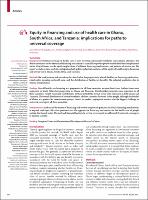| dc.contributor.author | Mills, Anne | |
| dc.contributor.author | Ataguba, John E | |
| dc.contributor.author | Akazili, James | |
| dc.contributor.author | Borghi, Jo | |
| dc.contributor.author | Garshong, Bertha | |
| dc.contributor.author | Makawia, Suzan | |
| dc.contributor.author | Mtei, Gemini | |
| dc.contributor.author | Harris, Bronwyn | |
| dc.contributor.author | Macha, Jane | |
| dc.contributor.author | Meheus, Filip | |
| dc.contributor.author | McIntyre, Di | |
| dc.date.accessioned | 2021-12-02T06:38:07Z | |
| dc.date.available | 2021-12-02T06:38:07Z | |
| dc.date.issued | 2012 | |
| dc.identifier.issn | 01406736 | |
| dc.identifier.uri | https://resources.equityinitiative.org/handle/ei/281 | |
| dc.description.abstract | Background Universal coverage of health care is now receiving substantial worldwide and national attention, but debate continues on the best mix of financing mechanisms, especially to protect people outside the formal employment sector. Crucial issues are the equity implications of different financing mechanisms, and patterns of service use. We report a whole-system analysis—integrating both public and private sectors—of the equity of health-system financing and service use in Ghana, South Africa, and Tanzania. | |
| dc.format.extent | 126-133 p. | |
| dc.language.iso | en | |
| dc.publisher | The Lancet | |
| dc.rights | © 2012 Elsevier Ltd. All rights reserved. | |
| dc.title | Equity in financing and use of health care in Ghana, South Africa, and Tanzania: implications for paths to universal coverage | |
| mods.genre | journalArticle | |
| dc.identifier.doi | 10.1016/S0140-6736(12)60357-2 | |

